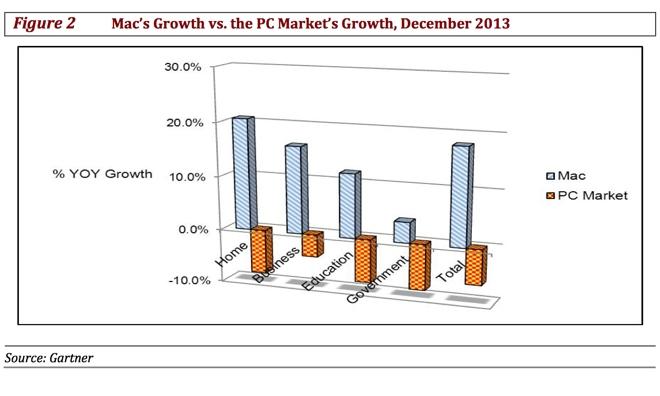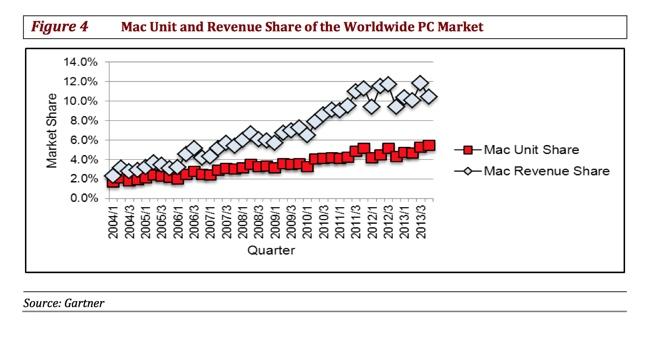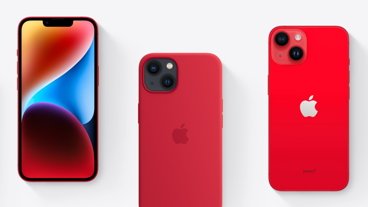While some pundits speculate that Mac lineup could be on the way out in favor of the iPad, Apple's traditional notebooks and desktops outpaced the overall PC market by nearly 25 percent last quarter, representing the largest margin separating the two in five years.
Apple's successful holiday quarter was highlighted this week by analyst Charlie Wolf with Needham & Company, who questioned whether the strong performance by the Mac is "a one-quarter blip" amidst a sinking PC market.
Mac shipments grew 18.1 percent in the December 2013 quarter, which outpaced the overall PC market by 24.7 percent. The year over year increase in Mac sales was a reversal for Apple, which has not been immune to consumer adoption of touchscreen tablets such as the iPad.
Overall PC shipments, which are dominated by Windows machines, have been shrinking year over year for the last seven quarters. Apple has also seen its Mac shipments decline in some quarters, but the company has still gained market share vs. Windows PCs in all quarters since 2005 but one.
The Mac's unit share of the worldwide PC market has grown from 2.1 percent in 2005 to 5.5 percent in 2013. Apple's revenue share growth has been even greater, surging from 3.2 percent to 10.4 percent.
As for Apple's particularly strong growth in the December quarter, where it posted sales of 4.8 million units, that was aided by a favorable year-over-year comparison: In the same period in 2012, Apple faced a severe shortage of its redesigned iMac, which limited Mac shipments in the quarter. That ended up being the lone quarter where PC shipments outgrew the Mac.
"The question we don't have an answer to is whether Mac shipment growth can overcome the headwinds of negative growth in PC shipments," Wolf wrote. "While the Mac represents a small fraction of Apple's revenues, it nonetheless is an important barometer of the health of Apple's ecosystem."
Wolf believes that tablets have "undoubtedly" cut into PC sales, though he questions the "magnitude of this effect" so far. He suggested that sales of the iPad might adversely affect Mac sales more than traditional Windows PCs.
"Shoppers at the Apple Stores most likely consider both a MacBook and an iPad for their next purchase," he said. "The allure of an iPad is undoubtedly far greater when it is in close proximity to a MacBook than it is in other shopping venues."
In a separate note issued earlier this month, Wolf detailed how Apple has held the Mac's average selling price steady at $1,300, even as overall PC prices have trended downward with the popularity of netbooks, and later tablets. The steady pricing helps to explain how Apple's dollar share of the PC market has outgrown its market share over the last decade.
 Neil Hughes
Neil Hughes








-m.jpg)






 Malcolm Owen
Malcolm Owen
 Amber Neely
Amber Neely


 Christine McKee
Christine McKee

 Chip Loder
Chip Loder
 Marko Zivkovic
Marko Zivkovic









50 Comments
I never trust analysts. They just rely on guesswork.
Either way, Apple is doomed. I haven't seen any signs of doomness, but Apple is still doomed somehow.
I'm Apple all the way and am happy Macs are growing faster than PCs (actually growing instead of falling) but graphs like these are why I hate graphs. Going from 2.1% to 5.5% worldwide marketshare in 8 years is the most critical information mentioned in this article. Tons of people are still buying Windows PCs, not Macs, and until Macs are closer to 50% of the mix, Apple is still behind. iOS devices are secondary computers for many people and they are killing Microsoft devices but now they have to fight Android garbage. Twist and turn the numbers any way you want then use them to justify an article just doesn't make it. It's the same garbage analysts use when talking about increases made by Apple competitors. Their sales go up 100% while Apple's only goes up 5% but Apple is talking about millions of units sold while the others are talking about thousands. Statistics are always used to justify someone's position but rarely mean everything. I am very happy Macs are still selling into every market although I wish they were selling more into the government (one of the largest continuous buyers of PCs).
Doomed. Rules of Apple punditry: 1. Apple is doomed. 2. Bad news for others is actually worse news for Apple 3. Good news for Apple is actually bad news 4. Only Apple needs revolutionary products 5. Apple must maintain margins AND sell no-profit phones.
BYOD will drive the business purchases in general down. The growth market for Macs is home and education (all those cheap 10 year old pcs are dying, and and edu discount mac Mini and/or macbook air make huge sense for an iPad leading market). Most businesses that have 'We only allow PCs in our corporate fiefdom' are moving to 'Our apps are in the cloud' in either a true web app, or in a Virtual Desktop Instance (VDI). As Business move understand the cost of provisioning PC hardware is crazy expensive, they will stipend their worker bees to get their own laptops. Most will be program discounts at dell, hp, or lenovo... but some people will buy Macs. In the end... Only the corporate elite, and the critical few power users [Real power users will have an AWS farm at their disposal, gone is the day where I need a 16core processor on my desk, when I can buy 128 cores the 3 days a month when I need them... a Macbook Pro and a couple TB screens is all I need to do my job from work and home] will have corporate owned hardware... and even there, the Mac Pro and the iPad Air will carve into PC sales. [disclaimer... I work in corporate consulting focusing on transformation of IT into a secure, fully extensible model... part of what I say may be marketing;-)]